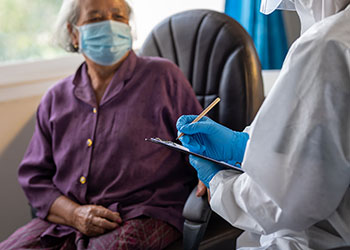Weight Loss Surgery Safe Care
Returning Safely to the Hospital for Weight Loss Surgery
A Q&A with the Weight Loss Surgery team at BIDMC
 Q: Is it safe to have surgery right now?
Q: Is it safe to have surgery right now?
A: Beth Israel Deaconess Medical Center (BIDMC) is taking many precautions to ensure your safety leading up to, during and following your surgery. Our safety measures meet or exceed guidelines issued by the Centers for Disease Control and Prevention (CDC), and the Massachusetts Department of Public Health.
Q: How are patients screened for COVID-19 prior to surgery?
A: We check with every patient three times before any medical appointment to confirm they are not experiencing symptoms of COVID-19. This includes at the time of scheduling, 24-72 hours before the appointment and again upon arrival.
Additionally, all surgical patients will receive a COVID-19 test within 48-72 hours before surgery.
Q: How do I know that my surgeon and the medical staff don't have COVID-19?
A: All staff members must complete an attestation form before every shift to confirm they do not have any of 12 possible symptoms associated with COVID-19. If a staff member reports any symptoms, they cannot return to work until they are evaluated and fully recovered.
In addition, all staff members wear multiple levels of protective personal equipment (PPE), including surgical masks or N95 respirators, gloves, gowns and eye protection. New PPE is worn when treating each patient.
Q: How do you clean and disinfect the operating rooms?
A: Each operating room is thoroughly cleaned and sanitized between surgical cases following CDC guidelines. The cleaning products used are effective against COVID-19.
Q: How do you separate surgical patients with COVID-19 from other patients?
A: Patients with COVID-19 are cared for in designated areas within the Pre- and Post-Anesthesia Care Units (PACUs), separate from patients without COVID-19. After surgery, they recover either in the operating room or in the designated PACU COVID area until they are discharged home or transferred to an inpatient unit.
Patients admitted to the hospital for an overnight stay with COVID-19 are cared for in COVID-capable rooms and continue to be separated from non-COVID patients.
Q: Do I need to wear a mask? What if I don't have a mask?
A: Yes, all patients, visitors and essential patient escorts must wear a mask at all times. A mask will be provided to anyone who arrives without one.
You will be required to wear a mask up until you are given anesthesia and/or through your surgery, depending on the discretion of your physician. A mask will be required again during your recovery process.
There are very limited exceptions to this rule. Please speak to your physician if you have any questions.
Q: If I need to be admitted after surgery, will I have a private room?
A: Private rooms are assigned based on medical necessity. Patients assigned to a semi-private room (2 patients per room) must have passed all COVID-19 pre-screening assessments.
Q: Can I bring someone with me on the day of my surgery?
A: We encourage you to come on your own, if you're able to. In the event a patient needs a family member or escort for physical, medical or other necessary reason, we will make every effort to accommodate. Escorts will be evaluated for symptoms of COVID-19 upon arrival at the hospital and will be required to wear a surgical mask or face covering at all times. If they have symptoms or a recent diagnosis of COVID-19, they will not be allowed into the hospital.
Q: Can I have visitors after surgery?
A: Patients are allowed one visitor at a time. Visiting hours are set around times appropriate to the patient's plan of care. Visitation may be prohibited on a case-by-case basis if visitation poses a significant infection control risk to patients, visitor, or staff.
All visitors are screened for COVID-19 symptoms upon entrance to BIDMC and are required to wear a surgical mask at all times while visiting inpatient areas. Individuals with COVID-19 symptoms will not be allowed into the hospital.
All visitors must perform proper hand hygiene before visiting a patient. Visitors should wait outside a facility, rather than in public areas like waiting rooms or cafeterias, until the time of their visit.
No visitors under the age of 18 are allowed unless the visitor is a child of a patient, in which case they must be over 12 years of age.
Visitors of patients with COVID-19 are required to wear appropriate PPE including a surgical masks, gloves, gown, and eye protection. Visit length will be limited to under one hour.
